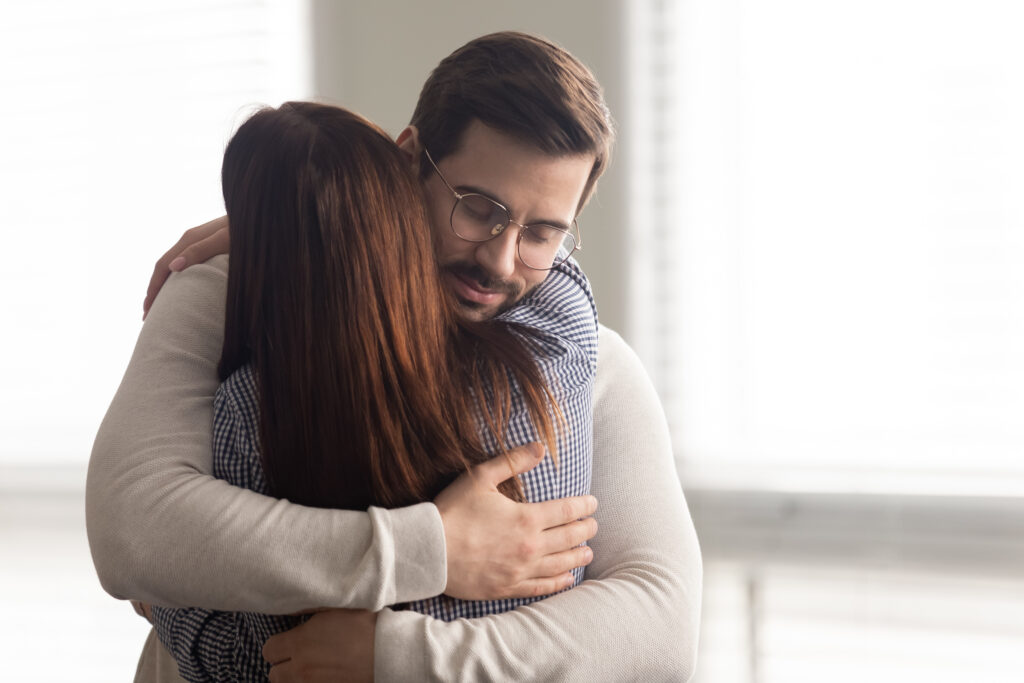
Your partner has cheated on you - and you are devastated. You were promised a promotion and now another colleague has moved up - anger is building up inside you. You simply can't forgive such injustices. You are sad, angry and disappointed. Depending on what it's about, your bad mood lasts for several days, weeks or even months.
How you can break through that? With forgiveness: This frees you from the negative feelings. You can look into the future again without constantly thinking about the bad memories. At the same time, you release the others involved from responsibility and reflect on your thoughts: What does this have to do with me? Why am I so affected right now?
Forgive a gross provocation? Forgive an affair? - Never! You feel betrayed and resentful. Some hurts are very painful and hold you tight. Betrayal by a loved one is especially bad. This does not only mean the Relationshipbut also your entire world view on the brink. And you are supposed to wipe that away so relaxed?
No, because forgiveness does not mean forgetting, but renouncing any kind of revenge. There is also a difference between forgiving and forgiveness. When you forgive, you approach the other person and say: Good, don't do it again, I'll refrain from cheating you as well - and we look forward together. With forgiveness, there is no question of possible retribution: here it is a kind of gift.
Forgiveness is therefore important because it can Acceptance of the experience and the present. You can no longer change what has happened. Memories cannot be switched off, but you can separate yourself from them internally. Depending on how bad the act to be forgiven is, this often takes time. But the journey is worthwhile and eases your pain.
When you forgive someone, you will feel something inside you relax. You feel the pain lessen. That has positive effects on your life:
Revenge thoughts and frustration make you in the long run unhappy. They also have a negative impact on your health. In other words: When you learn to forgive, your quality of life increases.

Forgive cheating - that might still work for a one-time thing. But forgetting? That only works for small things. But you can't completely forget an annoying situation, even if you don't want to hold a grudge.
"Forgive and forget," it's easy to say, but you don't want to repress anything. Especially in relationships, it is therefore better to keep the memories and practice forgiving.
An Cheating statistics and forgiveness shows that just under 24 percent of men and 26 percent of women are unfaithful. Is that so easy to cover up and forget? Hardly. Especially in the case of unfaithful women, often the Dissatisfaction with the partnership responsible for the flings.
Forgiving a one-time affair - this can work if both partners make an effort. And learn from it. Forgetting, however, sounds more like repressing, and then the real problems remain.
Those who forgive want to set the world right again. But that doesn't happen with a simple snap of the fingers; it takes time. First you have to deal with what happened. Someone hurt you, but not with malice aforethought. What exactly does the process of forgiving look like? The following tips should help you:
When we humans cannot forgive, there is usually a good reason for it. In the case of extremely serious injuries, it is even healthy to resist the desire for harmony. Not every act is forgivable and not every aggressor may demand forgiveness.
Can violence in a relationship be forgiven? Or a gross injustice at work?
In a partnership where one beats the other, there is often a clear imbalance. Possibly the weaker partner apologizes for the stronger one.
Whoever forgives abuse or violence is saying that the other person does not have to blame himself. But this can lead to a perpetual vicious circle. Forgiveness is certainly not a good option here - because it reinforces the imbalance.
"He doesn't deserve forgiveness" - this thought is a sign of your sense of justice. But how would you feel if you had experienced what the other person has gone through? You don't have to tolerate his actions, but if you manage to forgive anyway, it will put you in a more serene mood.
You forgive in order to maintain social ties - and to do something good for yourself. To do this, you put yourself in the place of the person who has hurt you. In this way you understand the motives and at the same time recognize the imbalance that has arisen. But you refrain from retaliation. This can take time, but it relieves you enormously.
Through the forgiveness you grant, you gain in inner strength. The experiences were difficult and perhaps very painful, but they are part of your life story.
Understanding the other person helps you to draw something positive from the bad events. You are not rewriting history, but integrating it into your personality. This is important in order to love yourself.
It requires greatness to forgive - at the same time, the ability to forgive makes you strong: This creates a positive cycle. The willingness to forgive increases your self-esteem and self-reliance. No wonder, then, that people who are willing to forgive are so at peace with themselves and radiate great serenity. They love others as themselves, and bring a great deal of understanding to bear for their own mistakes and those of others.
A little forgiveness brings great relief. But how do you succeed in overcoming a wrong? These three exercises train your ability to forgive:
Forgiving others and yourself is easier than you think. Show your willingness to forgive, because in doing so you strengthen your inner peace. Learn from it, and realize that most people have a positive basic attitude. Thereby you strengthen your self-confidence and your resilience.
At Greator you will learn a lot about Relationships and personal development - and learn to look to the future. This helps you to forgive others and yourself.

